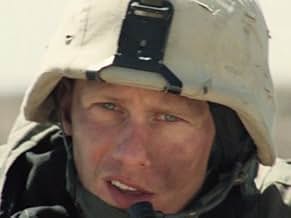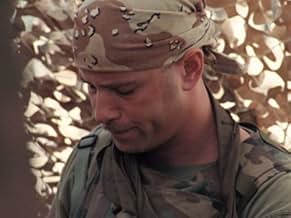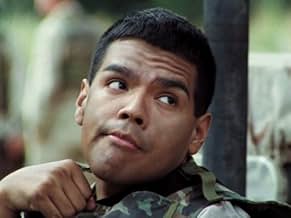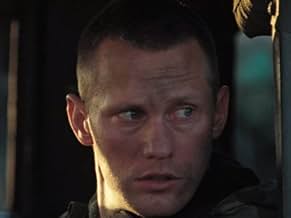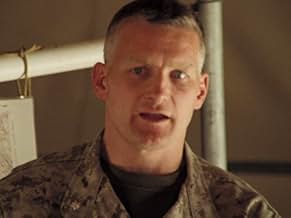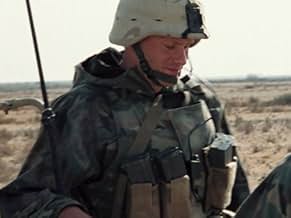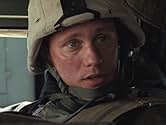A Rolling Stone reporter, embedded with The 1st Recon Marines chronicles his experiences during the first wave of the American-led assault on Baghdad in 2003.A Rolling Stone reporter, embedded with The 1st Recon Marines chronicles his experiences during the first wave of the American-led assault on Baghdad in 2003.A Rolling Stone reporter, embedded with The 1st Recon Marines chronicles his experiences during the first wave of the American-led assault on Baghdad in 2003.
- Won 3 Primetime Emmys
- 14 wins & 22 nominations total
Browse episodes
Featured reviews
Before some one comments on this mini-series they have to understand that is based entirely in truth. I first picked up the book while I was traveling home on leave shortly after returning from Iraq and read it in one sitting on the plane. One of the things that I find to be the most outstanding about the book and the series so far is that it is true to the people. I don't mean that it gives us something new and authentic to ponder. I can't think of any instance where the book or show goes into the political aspect of Iraq. And you know why. Because Marines don't make policy. They enforce it, regardless of there personal feelings towards it.
I am personally tired of hearing the comments about the show being cliché' If they spend anytime around the military they will find that most of characters portrayed are just like the young men serving. Marines are a different breed. They are asked to do different things that most of society would not understand. Enjoy the show and try not to get your mind wrapped around it to much.
I am personally tired of hearing the comments about the show being cliché' If they spend anytime around the military they will find that most of characters portrayed are just like the young men serving. Marines are a different breed. They are asked to do different things that most of society would not understand. Enjoy the show and try not to get your mind wrapped around it to much.
Proof that "Generation Kill", the miniseries produced by HBO films and written by David Simon and Ed Burns, their first project after the end of their television landmark "The Wire", a series which is completely incomparable in quality and scope to anything which has come before or since, is too intelligent to be concerned with simplistic political sloganeering, blind patriotism, or taking an anti-militaristic stance is the reaction which the political extremes have had to it. Any person with far right views I've spoken to or read on the internet has said similar things: this movie emasculates the marines and turns them into bleeding heart liberals (presumably because the film, and I will be referring to this as a film from this point onwards because it's definitely as much a film as "Berlin Alexanderplatz" is, has the guts to portray them as having compassion for wounded or killed civilians), and any person with far left views I've spoken to has apparently found the film to be immoral, presumably because it portrays men who spew violent, racist, homophobic, and misogynist invective as human beings.
In fact, "Generation Kill" is the farthest thing from either celebrating the military or being anti-militaristic. Like on "The Wire", David Simon and Ed Burns are on the side of the working class, as Kent Jones in Film Comment points out, and they have no interest in making a moral judgment on the nature of the work they're portraying, whether it's teaching, politics, drug dealing, or invading a country. Like Simon went beyond portraying drug dealers on "The Wire" to transporting us to their world and showing us their own problems, their own moral standards, their own worries and concerns, and introduced us to their own vernacular, he does the same with the marine corps in "Generation Kill". Like "The Wire", this is cunning and clever drama: it is political without taking sides, concerned with the inefficiency and bad planning coming 'from above' but without putting the blame on any individuals. It portrays people, some less likable and morally or politically correct than others, but people.
The only thing keeping "Generation Kill" from truly being a military version of "The Wire" is that its comparatively limited scope- it takes place within the first, 'triumphant' week of the invasion, and focuses pretty much only on one group of people. I'm entirely convinced that Simon could have written a thoroughly engrossing and fascinating drama about the Iraq war which extended past these five days, one which would have taken us past the marine corps into the lives of the other military units involved in the invasion, and the higher-ups as well, as he did starting in season 3 in "The Wire". As it stands, this is not a limitation of the power which "Generation Kill" holds, but a masterstroke in its success of making its point: every element which has made the situation in Iraq so chaotic was present in a latent form from the beginning. The film is not even really making a moral judgment of the war in Iraq, if anything it supports a well-executed version of it: most of the Iraqis we see, nearly 90% of them, are incredibly grateful, at least at this early stage, for being relieved of Saddam's rule.
Moreover, no American marine or any Iraqi is portrayed simplistically as a 'bad guy' or 'good guy', not even the bloodthirstiest of the Americans, and this writing is brought to life admirably well by the mostly perfect cast and the excellent direction and production value (it is obviously not a big-budget Hollywood film, but it still achieves real authenticity in almost every regard- the closest I came to disbelieving it was when a few Iraqis were portrayed as darker-skinned than any I've seen). The closest thing to a villain in the film is Saddam himself, who makes no literal appearance outside of posters on the streets, but then again he is pretty much the closest thing to a movie 'bad guy' in reality.
"Generation Kill" is, like "The Wire", ultimately a workplace drama about workplace politics. That the stakes are higher and that the innocent are killed even more often than they are on "The Wire" is irrelevant to the writers. This may make "Generation Kill" boring to those accustomed to and expecting a more standard war film, one which attempts an anti-war or pro-war statement. Like "The Wire" again, what the viewer is left with in the end is only a dislike of unnecessary violence and casualties, and a portrayal of the toll they take on those involved in either perpetrating the violence or those related to the victims. Both "The Wire" and "Generation Kill" are dramatically built on disappointment and disillusionment with the system in place itself, and like "The Wire" it is all about bad decisions, mistakes, and the rare good decision. The film ends with a montage and a song, much like every season of "The Wire", and with its subtle summation of the hours gone by and its emotional impact it cements David Simon's status as one of the greatest and most important writers of our time.
In fact, "Generation Kill" is the farthest thing from either celebrating the military or being anti-militaristic. Like on "The Wire", David Simon and Ed Burns are on the side of the working class, as Kent Jones in Film Comment points out, and they have no interest in making a moral judgment on the nature of the work they're portraying, whether it's teaching, politics, drug dealing, or invading a country. Like Simon went beyond portraying drug dealers on "The Wire" to transporting us to their world and showing us their own problems, their own moral standards, their own worries and concerns, and introduced us to their own vernacular, he does the same with the marine corps in "Generation Kill". Like "The Wire", this is cunning and clever drama: it is political without taking sides, concerned with the inefficiency and bad planning coming 'from above' but without putting the blame on any individuals. It portrays people, some less likable and morally or politically correct than others, but people.
The only thing keeping "Generation Kill" from truly being a military version of "The Wire" is that its comparatively limited scope- it takes place within the first, 'triumphant' week of the invasion, and focuses pretty much only on one group of people. I'm entirely convinced that Simon could have written a thoroughly engrossing and fascinating drama about the Iraq war which extended past these five days, one which would have taken us past the marine corps into the lives of the other military units involved in the invasion, and the higher-ups as well, as he did starting in season 3 in "The Wire". As it stands, this is not a limitation of the power which "Generation Kill" holds, but a masterstroke in its success of making its point: every element which has made the situation in Iraq so chaotic was present in a latent form from the beginning. The film is not even really making a moral judgment of the war in Iraq, if anything it supports a well-executed version of it: most of the Iraqis we see, nearly 90% of them, are incredibly grateful, at least at this early stage, for being relieved of Saddam's rule.
Moreover, no American marine or any Iraqi is portrayed simplistically as a 'bad guy' or 'good guy', not even the bloodthirstiest of the Americans, and this writing is brought to life admirably well by the mostly perfect cast and the excellent direction and production value (it is obviously not a big-budget Hollywood film, but it still achieves real authenticity in almost every regard- the closest I came to disbelieving it was when a few Iraqis were portrayed as darker-skinned than any I've seen). The closest thing to a villain in the film is Saddam himself, who makes no literal appearance outside of posters on the streets, but then again he is pretty much the closest thing to a movie 'bad guy' in reality.
"Generation Kill" is, like "The Wire", ultimately a workplace drama about workplace politics. That the stakes are higher and that the innocent are killed even more often than they are on "The Wire" is irrelevant to the writers. This may make "Generation Kill" boring to those accustomed to and expecting a more standard war film, one which attempts an anti-war or pro-war statement. Like "The Wire" again, what the viewer is left with in the end is only a dislike of unnecessary violence and casualties, and a portrayal of the toll they take on those involved in either perpetrating the violence or those related to the victims. Both "The Wire" and "Generation Kill" are dramatically built on disappointment and disillusionment with the system in place itself, and like "The Wire" it is all about bad decisions, mistakes, and the rare good decision. The film ends with a montage and a song, much like every season of "The Wire", and with its subtle summation of the hours gone by and its emotional impact it cements David Simon's status as one of the greatest and most important writers of our time.
10grantss
The story of 1st Marine Reconnaissance Battalion's participation in the second Allied invasion of Iraq, in 2003. Seen through the eyes of Rolling Stone reporter Evan Wright, who was embedded with the Battalion and upon whose book the series is based.
Quite brilliant. Although dramatized, this is pretty much a warts-and-all account of a military unit in combat. Hardly glamorous, it shows well the problems they face, both external and internal. Without trying to be critical or political it also shows well the fine line between being viewed as liberators and invaders: the PR aspect, or more particularly how badly the hearts-and-minds aspect of Operation Iraqi Freedom was messed up, is well examined.
Not all drama, explosions and action - there are many great comedic moments too, especially in the dialogue.
Accurate, engrossing and entertaining.
Quite brilliant. Although dramatized, this is pretty much a warts-and-all account of a military unit in combat. Hardly glamorous, it shows well the problems they face, both external and internal. Without trying to be critical or political it also shows well the fine line between being viewed as liberators and invaders: the PR aspect, or more particularly how badly the hearts-and-minds aspect of Operation Iraqi Freedom was messed up, is well examined.
Not all drama, explosions and action - there are many great comedic moments too, especially in the dialogue.
Accurate, engrossing and entertaining.
I'm also glad there is no music. Music (though moving) would have taken away the grit to this story and given it a more artificial feel. It's amazing how much of the dialog and situations are straight from the book, and how perfectly spot on they are showing Recon Marine culture.
I'm glad Rudy and Kocher got to play themselves. Though I only personally know Pappy out of these characters, it's obvious they are working as hard as they can (within Hollywood's tradition) to portray it as it happened. I hope they continue this series at least until the end of the invasion. I can't wait to see the action at the bridge and the other ambushes.
Oh, and the Sgtmaj. harping on grooming standards during combat operations is so hilarious because it's so true!
I'm glad Rudy and Kocher got to play themselves. Though I only personally know Pappy out of these characters, it's obvious they are working as hard as they can (within Hollywood's tradition) to portray it as it happened. I hope they continue this series at least until the end of the invasion. I can't wait to see the action at the bridge and the other ambushes.
Oh, and the Sgtmaj. harping on grooming standards during combat operations is so hilarious because it's so true!
What you get to see here is a one-of-a-kind mini-series: this is as close to a documentary as it gets. The realities of modern warfare are shown honestly with no political agenda and you are left to draw your own conclusions.
When I watched this series I remembered a quote from another film, 'The Siege' from 1998, where Bruce Willis' character, a high ranking army official, says something along the lines of: "The army is a broad sword - not a scalpel. So trust me, you do not want to call the army, unless you have absolutely no other option".
From an artistic point of view what stands out the most is the ensemble of actors. Not once during the entire seven episodes did I not believe I was watching the actual characters - the performances and the direction in this production are flawless. I've never seen a series that felt as real as this.
This goes beyond mere entertainment - this is simply the best contemporary television has to offer. 10 out of 10.
Favorite films: http://www.IMDb.com/list/mkjOKvqlSBs/
Lesser-known Masterpieces: http://www.imdb.com/list/ls070242495/
Favorite Low-Budget and B-Movies: http://www.imdb.com/list/ls054808375/
Favorite TV-Shows reviewed: http://www.imdb.com/list/ls075552387/
When I watched this series I remembered a quote from another film, 'The Siege' from 1998, where Bruce Willis' character, a high ranking army official, says something along the lines of: "The army is a broad sword - not a scalpel. So trust me, you do not want to call the army, unless you have absolutely no other option".
From an artistic point of view what stands out the most is the ensemble of actors. Not once during the entire seven episodes did I not believe I was watching the actual characters - the performances and the direction in this production are flawless. I've never seen a series that felt as real as this.
This goes beyond mere entertainment - this is simply the best contemporary television has to offer. 10 out of 10.
Favorite films: http://www.IMDb.com/list/mkjOKvqlSBs/
Lesser-known Masterpieces: http://www.imdb.com/list/ls070242495/
Favorite Low-Budget and B-Movies: http://www.imdb.com/list/ls054808375/
Favorite TV-Shows reviewed: http://www.imdb.com/list/ls075552387/
Did you know
- TriviaOn the DVD audio commentary, David Simon recalled Neal Jones's somewhat unorthodox audition for the role of Sgt. Major Sixta. According to the story, Jones entered the audition room, immediately began screaming his lines unintelligibly - much like his character does - and then walked out of the room without another word. As he opened the door to leave, he winked at casting director Alexa L. Fogel, and she realized she had the right actor for the role.
- Quotes
Cpl. Gabe Garza: Hey. There's kids holding hands.
Sgt. Brad 'Iceman' Colbert: Oh cute. Don't shoot 'em, Garza.
- ConnectionsFeatured in The 61st Primetime Emmy Awards (2009)
Details
- Runtime
- 1h(60 min)
- Color
- Aspect ratio
- 1.78 : 1
Contribute to this page
Suggest an edit or add missing content

![Watch Trailer [OV]](https://m.media-amazon.com/images/M/MV5BMzAyZGM1ZmItYmFkOS00Zjk1LWEzNDEtMWFhMTlkNzRhYzUxXkEyXkFqcGdeQXRyYW5zY29kZS13b3JrZmxvdw@@._V1_QL75_UX500_CR0)

